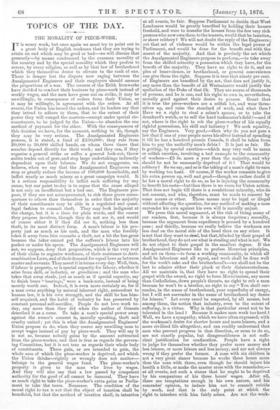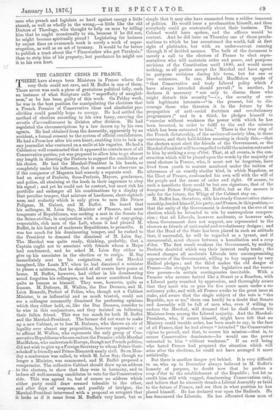TOPICS OF THE DAY.
THE MORALITY OF PIECE-WORK.
IT is weary work, but once again we must try to point out to a great body of English workmen that they are trying to attain an end which may be good or bad—we will discuss that presently—by means condemned by the common morality of the country and by the special morality which they profess to revere, by every religion, as well as by that law of brotherhood which they themselves desire to elevate to the rank of one. There is danger lest the dispute now raging between the Amalgamated Engineers and their employers should assume the proportions of a war. The owners of the Erith Ironworks have decided to conduct their business by piece-work instead of weekly wages, and the men have gone out on strike, it may be unwillingly, in consequence of orders from their Union, or it may be willingly, in agreement with the orders. At all events, the Union has issued the orders, and its leaders say that they intend to adhere to them, that to the extent of their power they will compel the masters—except under special cir- cumstances, to be judged by the Union—to abandon the one method of payment for the other. With the consequences of this decision we have, for the moment, nothing to do, though they may be very serious. The Amalgamated Engineers possess, it is stated, a fund of £250,000; they rule from 20,000 to 30,000 skilled hands, on whom three times that number depend directly for their work; and they can, if they organise a general strike or suffer a general lock-out, throw entire trades out of gear, and stop large undertakings indirectly dependent upon their labours. We do not exaggerate, we believe, when we say that the Amalgamated Engineers can stop or greatly reduce the income of 100,000 households, and inflict nearly as much misesy as a great campaign would. It is a serious responsibility to inflict such suffering for any cause, but our point to-day is to argue that the cause alleged is not only an insufficient but a bad one. The Engineers pro- pose, if they are not misrepresented, to risk these grave conse- quences to others than themselves in order that the majority of their constituents may be able in a regulated and quasi- legal fashion to commit theft. They may look indignant at the charge, but it is a time for plain words, and the course they propose involves, though they do not see it, and would of course abhor it if they did see it, nothing less than theft, in its most distinct form. A man's labour is his pro- perty just as much as his cash, and the man who forcibly takes it away from him commits a theft, not a bit the less gross because the taker cannot put the sufferer's labour into his pocket or under his apron. The Amalgamated Engineers will not, we suppose, deny that proposition, which is the very root of their claim to organise workmen, of their resistance to Anti- combination Laws, and of their demand for equal laws as between master and servants. They assert it in terms every day. Well, then, if labour is property, so is special capacity for labour, whether it arise from skill, or industry, or greediness ; and the man who takes that away steals, just as much as if special capacity, say to finish brass "bearings," were a bank-note, instead of being merely worth one. Indeed, it is even more certainly so, for if a man owns anything by natural inherent right, antecedent to human law, it is his own strength, and the skill he has him- self acquired, and the habit of industry he has preserved by constant personal self-sacrifice. People do not love work to- day, any more than they did when the author of Genesis described it as a curse. To take a man's special power away against the owner's consent is, morally speaking, theft and cruelty united ; yet this is what the Amalgamated Engineers' Union propose to do, when they coerce any unwilling man to accept wages instead of pay by piece-work. They will say it is not so, because nobody gains by the amount subtracted from the piece-worker, and that is true as regards the govern- ing Committee, but it is not true as regards their whole body of constituents. These gain, or are intended to gain, the whole sum of which the piece-worker is deprived, and which the Union thinks—rightly or wrongly does not matter— belongs to the general wages fund. The piece-worker's property is given to the man who lives by wages. And they will also say that a law passed by competent authority for the good of all cannot be immoral. They have as much right to take the piece-worker's extra gains as Parlia- ment to take the taxes. Nonsense. The condition of the moral right to tax is not that the object of taxation shall be beneficial, but that the method of taxation shall, in intention 1 at all events, be fair. Suppose Parliament to decide that West Londoners would be greatly benefited by holding their houses freehold, and were to transfer the houses from the few very rich persons who now own them to the tenants, would that be taxation, or sheer robbery? We will not doubt the reply of the Engineers yet that act of violence would be within the legal power of Parliament, and would be• done for the benefit and with the- assent of the majority. And that is precisely the act which the Amalgamated Engineers propose to perform —to take away from the skilled minority a possession which they have, for the- benefit of the majority. They have no right to do it, and na plea of benevolence, or brotherhood, or general convenience- can give them the right. Suppose it is true that ninety per cent. of Engineers are benefited by the act, that does not justify it, any more than the benefit of all Westminster would justify the spoliation of the Duke of that ilk. They are scores of thousands- of persons, and he is one, and his right to own is, nevertheless,. morally good against their desire to possess. Grant that it is true the piece-workers are a selfish lot, and wear them- selves up, and raise the standard of work, and what then ? Have we a right to steal a miser's spoons, or to take the drunkard's watch, or to sell the hard taskmaster's field ?—and if not, where is the right to rob the piece-worker of his equally righful possessions, his skill and industry ? We seek equality,. say the Engineers. Very good,—then why do you not pass a law that if one of your people saves his silver instead of spending it till he has a hundred pounds Consols, it shall be taken from. him to pay the unthrifty men's debts? It is just as fair. He. is getting, by special exertion—which may very well be mean or selfish exertion, involving a bad example to the community of workers—£3 Ss. more a year than the majority, and why should he not be summarily deprived of it ? That would be robbery? So we say, and so is the taking of a man's right to earn by working too hard. Of course if the worker consents to give his extra powers up, well and good—though we rather doubt if he has a moral right to do so as he is injuring the community to benefit his caste—but then ;here is no room for Union action. That does not begin till there is a recalcitrant minority, who do not consent, and who, therefore, must be made to consent by some means or other. those means may be legal or illegal without affecting the question, for any method of making a man surrender his own against his own will is morally unjust.
We press this moral argument, at the risk of tiring many of our readers, first, because it is always forgotten ; secondly, because the argument from expediency is pressed by a hundred pens ; and thirdly, because we really believe the workmen are less deaf on the moral side of the head than on any other. It is not that they want to steal, but that, blinded by their gospel of brotherhood, they do not see what is stealing and what is not. We do not object to their gospel in the smallest degree. If the Amalgamated Engineers like to profess Moravian principles, and act on them—to form a working community, in which all shall be laborious and all equal, and work shall be done well for the work's sake and the brotherhood's—we shall not be the last to admire either their pluck or their disinterestedness. All we maintain is, that they have no right to spread their gospel with the sword, no right to force Moravianism, any more than Catholicism, down people's throats, no right to rob a man because he won't be a brother, no right to say "You shall sur- render, in the name of brotherhood, your superfluity of energy, but I Will not surrender in the name of brotherhood my desire for leisure." Let every creed be respected, by all means, but among them, the notion that industry, even to the extent of suffering, is a virtue. Why is that particular creed not to be tolerated in the land? Because it makes men work too hard ? Well, we have a sympathy, which we have often expressed, with the workman's desire for shorter hours and more leisure, and a more civilised life altogether, and can readily understand that men who prevent progress in that direction, or seem to do so, are not exactly popular, but disagreeableness is not suffi- cient justification for confiscation. People have a right to judge for themselves whether they prefer more money and less leisure, or more leisure and less money, and are not always wrong if they prefer the former. A man with six children is not a very great sinner because he works three hours more than the man with three, even though he should injure his health a little, or make the master cross with the remainder,— at all events, not such a sinner that he ought to be deprived by his companions of his three hours' wages. After all, there are temptations enough in his own nature, and his comrades' opinion, to induce him not to commit suicide by work, and that is the only point at which the right to interfere with him fairly arises. Are not the work- men who preach and legislate so hard against energy a little absurd, as well as wholly in the wrong,—a little like the old Doctors of Theology, who thought to help on man by telling him that he ought occasionally to sin, because if he did not, he might become spiritually proud ? Legislating for laziness by unjust fines on overmuch work is surely a work of super- erogation, as well as an act of tyranny. It would be far better to publish a tract about the "Pieceworker who got Paralysis," than to strip him of his property, lest perchance he might use it to his own hurt.



































 Previous page
Previous page